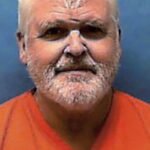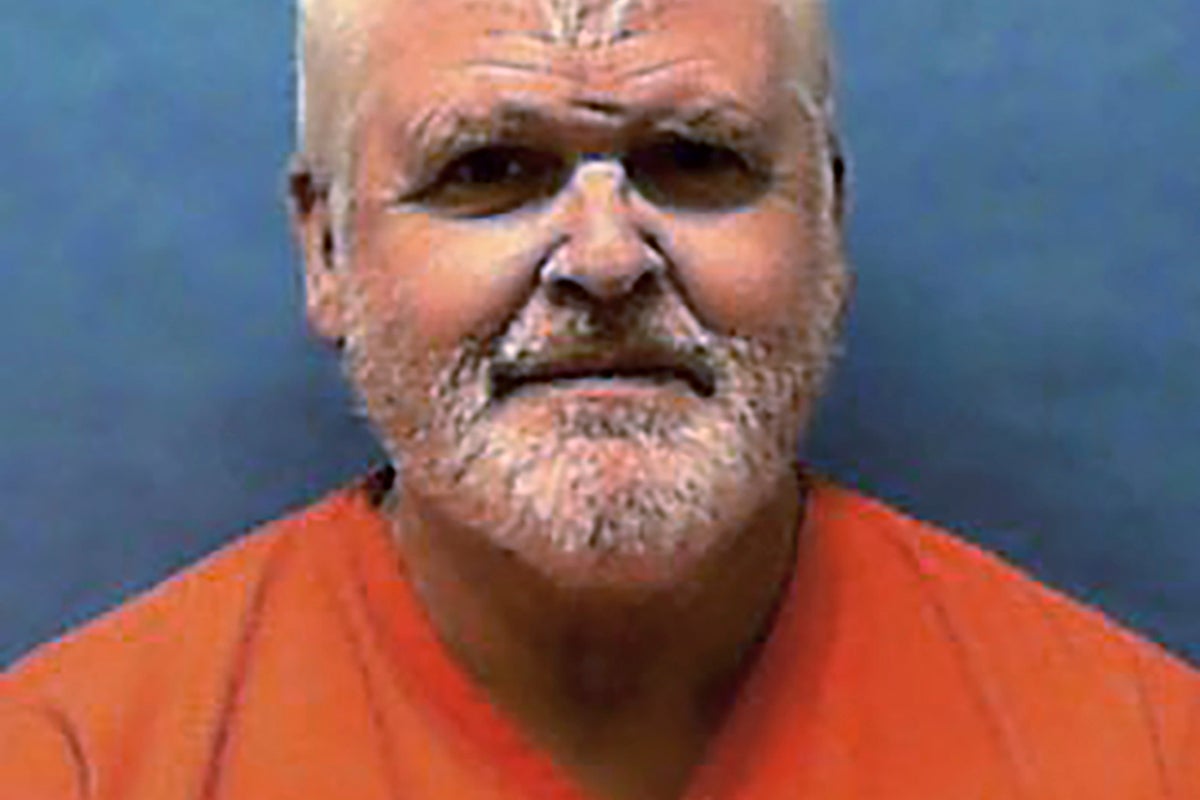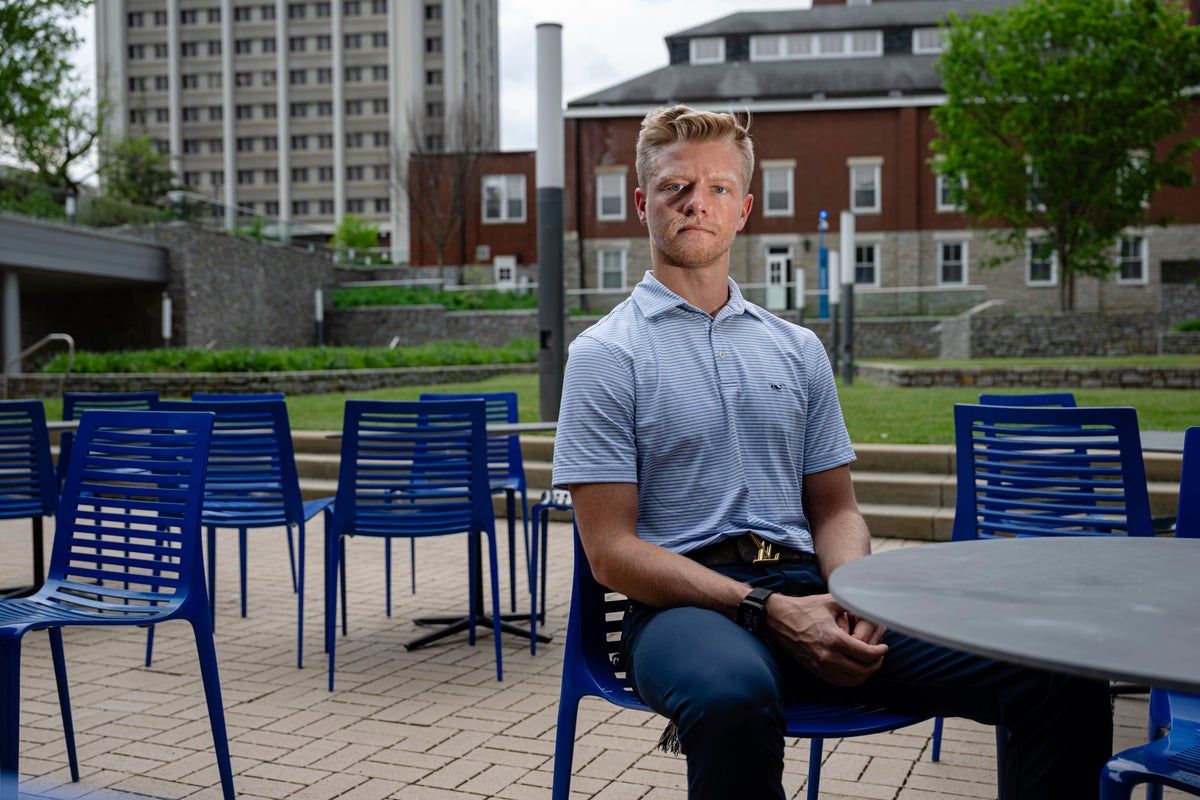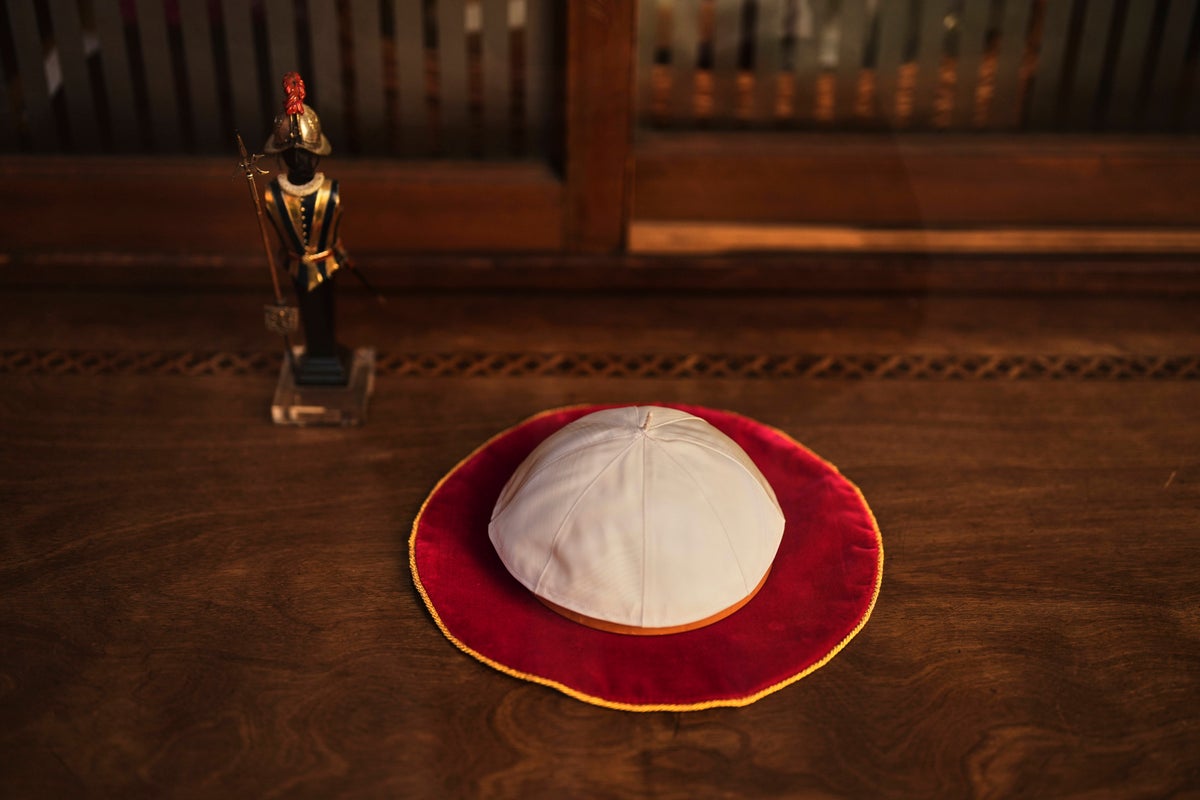As the bus drove away from the Bluebonnet Detention Facility, in Anson, Texas, on April 18, Stiven Prieto Viera feared he was headed to El Salvador. Prieto, a Venezuelan barber detained last month by US Immigration and Customs Enforcement, knew that the Trump administration had already sent hundreds of his compatriots to that country’s infamous Terrorism Confinement Center (CECOT). Now, he appeared to be facing the same fate.
The day before, ICE had handed Prieto and about 60 other Venezuelan men held at Bluebonnet a one-page document—written only in English—stating they were going to be removed from the United States under the Alien Enemies Act as members of Tren de Aragua (TdA).
This “Notice and Warrant of Apprehension and Removal under the Alien Enemies Act” contained no evidence to support the allegation that the men were part of TdA, a Venezuelan gang the Trump administration has designated as a foreign terrorist organization. Nor did it say how they could contest their removal based on the 18th-century law, which had only been used three times in US history before President Donald Trump invoked it last month. Prieto refused to sign the paper.
Less than 24 hours later, immigration officials loaded Prieto and dozens of other Venezuelans onto a bus and at least one van. Some of the men on board had been told that they were being sent back to Venezuela. They were chanting and praying, in part relieved to be going home. “That’s what we wanted,” one of the men later told Mother Jones, “to return to Venezuela and to our families.” But Prieto doubted that was the case. The imposing police escort in front and behind the bus suggested something more sinister. The men were reportedly en route to a regional airport 30 miles away and, from there, possibly to El Salvador.

In the end, no flights to the Central American nation took off from Texas that Friday. Following a frantic legal effort by the ACLU, the convoy turned around and returned Prieto and the other Venezuelans to Bluebonnet. Later, at around 1:00 a.m. on Saturday, the Supreme Court blocked the Trump administration from removing Venezuelans detained at Bluebonnet under the authority of the Alien Enemies Act. That order appears to be the only thing stopping them from potentially being sent without due process to a prison so notorious for human rights abuses that it is often called a “gulag.”
The men now stuck at Bluebonnet nearly became the latest casualties of the Trump administration’s use of extraordinary wartime powers to conduct summary removals. Like many of the more than 230 Venezuelans trapped in CECOT, those waiting in Bluebonnet have been labeled “alien enemies” based on flimsy evidence, a Mother Jones investigation found. In several cases, the men detained told us they were abruptly moved to the Texas facility in transfers that seem to be attempts to circumvent court orders blocking Alien Enemies Act removals in other jurisdictions across the country. Now, they are in limbo—caught between a temporary Supreme Court ruling and an administration willing to flout the rule of law.
Mother Jones has interviewed six of the estimated 60 men at Bluebonnet the Trump administration is trying to remove using the Alien Enemies Act. In phone and video calls from their cell block, the six Venezuelans vigorously denied having ties to Tren de Aragua. Many of them believe they have been targeted because of tattoos that they said have nothing to do with the gang. All six men have pending immigration cases. Unless they are removed under the Act, they will have a chance to make a case before an immigration judge to be allowed to remain in the United States. At those hearings, ICE prosecutors would also have an opportunity to present any evidence they may have of gang membership.
White House deputy chief of staff for policy Stephen Miller has claimed that the Venezuelans at Bluebonnet targeted under the Alien Enemies Act “are documented foreign terrorists” who were “arrested in diligently planned and executed raids recently carried out by the Departments of Justice and Homeland Security.” But, as part of this investigation, Mother Jones found no records of arrests or criminal history in the United States for five of the six men we talked to. The sixth was arrested by police in Illinois last year on suspicion of stealing from ATMs, according to a police report obtained via a Freedom of Information Act request. But the charges against him were promptly dropped.
Relatives of the men Mother Jones spoke with have also maintained that the accusations against them are baseless, sharing official documents showing they have no criminal histories in Venezuela, annotations that explain the innocuous meanings of tattoos that ICE appears to be using as evidence of gang membership, and, in one case, a sworn declaration from a family member living in the United States.
On April 18, Mother Jones asked the Department of Homeland Security if the Bluebonnet detainees were going to be sent to El Salvador. DHS Assistant Secretary for Public Affairs Tricia McLaughlin declined to answer, saying “We are not going to reveal the details of counter terrorism operations.” DHS did not respond to subsequent requests for comment for this article that asked for any evidence that the six men interviewed by Mother Jones are affiliated with Tren de Aragua.
The six Venezuelans, whose accounts have not been previously reported, provided the most comprehensive explanation to date of the circumstances of their near-removal. Their experiences raise significant doubts about the Trump administration’s compliance with legal requirements.
Earlier this month, the Supreme Court unanimously mandated that Venezuelans subject to removal under the Alien Enemies Act be given “reasonable time” and proper notice to defend themselves in court prior to removal. But in the case of the Bluebonnet detainees, the administration appears to have responded to the justices’ command with a rushed notification process that will likely make it impossible for many innocent Venezuelans to avoid being wrongly removed and potentially imprisoned in El Salvador’s CECOT, where they could effectively disappear. None of the Venezuelans sent to the prison last month have been heard from since. (In her April 18 response, McLaughlin said the administration is “complying with the Supreme Court’s ruling.”)
“What happened at Bluebonnet shows the risks of tossing aside due process,” said Aaron Reichlin-Melnick, a senior fellow with the American Immigration Council. “Strong evidence suggests that the Trump administration was prepared to send people innocent of any crime to be imprisoned indefinitely in a foreign nation without even the semblance of due process.”
Rutdelys Rojas, Prieto’s partner, was matter-of-fact about the Venezuelan men’s ordeal. “We get it,” she said. “We’re not wanted here. That’s just the reality, right?”
“But there’s a difference between being judged as a migrant, which is understandable,” Rojas continued. “We all have to go before a judge and fight our case. It’s another thing to be accused of being part of a criminal gang just because you’re a migrant, when gangs were one of the main reasons you fled your country.”

On the morning of March 20, Omar Cárdenas Martínez got in his car to do some deliveries for Uber and DoorDash around Dallas as a side gig. As he got ready to drive, Cárdenas noticed a police van that looked like it was about to intercept him.
In 2023, as Mother Jones reported in a piece published on the day of his near removal, Cárdenas legally entered the United States at an official port of entry after making an appointment on the CBP One app. From there, he said that he did everything by the book: “The first thing I did when I entered the United States was to get life insurance and health insurance so that I wouldn’t be a burden on the United States.” After getting his work permit, he got a job at an H-E-B supermarket, where he was proud to have recently received a promotion.
Cárdenas was perplexed when the police van stopped behind his car. Then, he saw a man with a gun. Cárdenas said in a video call on April 24 that he raised his hands and asked what was happening. He soon realized that about six ICE officers had shown up to arrest him on the grounds that he was allegedly a member of TdA.
“There’s no evidence, no crimes—nothing. It’s simply because he had tattoos.”
After being loaded into the police van, Cárdenas saw Prieto, the Venezuelan barber. Prieto had been arrested by ICE outside his home earlier that morning. The agents took both men to an ICE office in Dallas. Once there, Cárdenas said an ICE agent asked him if he had any tattoos. Cárdenas said he did. The ICE agent proceeded to take photos of the tattoos without asking any questions about what they meant, according to Cárdenas, and processed him as a member of Tren de Aragua.
One of Cárdenas’ tattoos is of a pocket watch, which ICE has claimed can be evidence of TdA membership. In Cárdenas’ case, it has an obvious meaning unrelated to the gang: It includes the name of Omar’s father and the Roman numerals for March 30, 2020. That is the date Cardenas’ father died, according to a death certificate from Venezuela shared with Mother Jones.
Experts on Latin American criminal organizations have stressed that Tren de Aragua does not use tattoos as a form of identification. “I have extensive experience studying street and prison gangs,” Steven Dudley, the co-director of InSight Crime, a media organization and think-tank that researches organized crime in the Americas, wrote in a March court declaration. “Some of them do have tattoos that indicate gang affiliation. As of this writing, Tren de Aragua does not have any such tattoos.”

Another of Cárdenas’ tattoos is an anchor adorned with roses; it is meant to symbolize his family members, according to a document provided by a relative who lives in the United States and asked to remain anonymous. In 2016, Cárdenas posted an image of the tattoo on his public Instagram account. Translated into English, the caption reads, “#family #faith #hope #love #tattoo.”
Rojas, Prieto’s partner, was outraged by the lack of due process. “They didn’t show my husband an arrest warrant. They didn’t tell him anything—just that he’s with Tren de Aragua,” Rojas explained. “That’s it. That’s the answer they gave. No other explanation. There’s no evidence, no crimes—nothing. It’s simply because he had tattoos.”
In the days after taking Cárdenas and Prieto into custody, ICE posted photos of the men on social media, accusing both of being Tren de Aragua members. The accusations are now the first things that show up on Google when searching the men’s full names.
During the video call from detention, Prieto showed Mother Jones some of his many tattoos. Several of them have to do with his work as a barber—a job he’s done for more than a decade. He explained that his tattoos led to immigration officials accusing him of being a gang member after he entered the United States and turned himself in to Border Patrol in 2022. That led to him spending about seven months in detention before being released. After that, Prieto said he got a work permit and a provisional license as a barber after attending a cosmetology school. His Instagram page is almost entirely dedicated to showing off the often elaborate cuts he’s given clients.
Cárdenas was in a state of near disbelief when we spoke on Thursday. “This red uniform labels me as an aggressive person,” he said. “Because there are four colors: there’s green; there’s yellow; there’s orange; and there’s red. Red is the highest level. I’ve never committed a crime—never even a traffic ticket—and look at the uniform I’m wearing.”
The men’s transfer to Bluebonnet in the days and weeks leading up to their near-removal is unlikely to have been a coincidence. Several of the more than 200 Venezuelans sent to El Salvador last month were removed from the same place in Texas, the El Valle detention facility north of Brownsville. On April 9, Southern District of Texas Judge Fernando Rodriguez Jr., a Trump appointee, issued a Temporary Restraining Order in response to an ACLU lawsuit that blocked anyone in that district from being removed under the Alien Enemies Act. Soon after, the Trump administration concentrated Venezuelans at Bluebonnet, where the ACLU had not yet brought a suit and no such order existed.
“The cops, when they had us here, they kept laughing a lot. I asked them, ‘Where are we going? Are we being sent to my country—to Venezuela?’ And they said, ‘Yeah, obviously you’re going to Venezuela.’ But they laughed in this kind of evil way.”
The use of the Alien Enemies Act—and what counts as “reasonable” notice for those subject to removal under the law—is now being litigated in courts across the country. In a declaration unsealed by Judge Rodriguez last week, an ICE official said people are given 12 hours after receiving the notice to make a phone call and “indicate or express an intent” to file a habeas corpus petition. If they do so, the ICE official said they are granted at least 24 hours to submit the petition.
The rushed process at Bluebonnet made it nearly impossible for the Venezuelans ICE tried to remove to file a habeas petition in time, particularly since many—if not most—of them do not have lawyers. Cárdenas said ICE did not even tell detainees that there is such a thing as a habeas process in the United States—much less that the Supreme Court recently determined that is the legal instrument they must use to challenge their removal under the Alien Enemies Act.
Gregori Díaz-Luces, another Venezuelan at Bluebonnet, said he had never heard of habeas corpus until a Mother Jones reporter mentioned it to him. The English-language form ICE pushed on him, and others, only stated: “If you desire to make a phone call, you will be permitted to do so.” It does not provide contact information for lawyers who could help them file a habeas petition or advise them that they have a right to contact an attorney.
The ICE official claimed in the declaration that agents explain the Alien Enemies Act form “to each alien in a language that [the] alien understands.” That assertion is contradicted by the experience of men at Bluebonnet, who told Mother Jones that they only received the notice in English. One of them said that when he asked for a Spanish version, he was told they couldn’t translate it. He also said he asked if an ICE officer could read it for him, but the officer refused.
Some of the Venezuelans at Bluebonnet may not even have had the 12 hours that ICE said it provides people to express an intent to file a habeas petition. When asked how much time had passed between receiving the one-page notice and boarding the bus, one of the detainees said two to three hours. In his case, Cárdenas said he was handed the document on Friday, April 18. “I received it on Friday,” he told Mother Jones. “Friday in the morning.” He was put on the bus that afternoon. (The exact times when he received the document and was loaded to the bus are still unclear; DHS did not respond to a question about whether detainees at Bluebonnet were given at least 12 hours to say they wanted to file a habeas petition.)
“Their 12/24 hour policy makes a mockery of due process,” Michael Kagan, the director of the immigration clinic at the University of Nevada, Las Vegas, who’s representing a client at Bluebonnet, said via email. “It is absurd to expect someone in detention to get a paper in a language they do not understand, contact a lawyer, have the lawyer draft not just one but two court filings (the habeas petition and a motion for a temporary restraining order), file them with a court, have the court read the documents; [and then] for the court act on the filings, and then get the right officials notified—that all of this has happened so that airplanes don’t take off, all within 24 hours. It’s an absurd proposition.” (The ICE official’s declaration states that, generally, the agency won’t remove someone with a pending habeas petition.)
Kagan said Adrian Viloria-Aviles—a 30-year-old with a pending asylum claim and Convention Against Torture case—would likely have been put on the April 18 bus if it had not been for a federal judge’s order halting his removal until June 20 that had been issued just a couple of days prior. He said Viloria-Aviles had no felony convictions, but two misdemeanor cases for firing a BB gun and driving without a valid license. “[Viloria-Aviles] filed his motion for a temporary restraining order when he was moved to Bluebonnet, where ICE was gathering Venezuelans, clearly for the purpose of expelling them,” Kagan wrote in an email. “What happened in Bluebonnet before the Supreme Court stepped in shows that he was right to be afraid.”
The Trump administration’s process, he added, “does not remotely comply with the Supreme Court’s instructions. It will cause human tragedy.”

On April 15, Virginia-based attorney Travis John Collins noticed three of his clients had “disappeared” from the Farmville Detention Center in Virginia. A few days earlier, according to a declaration Collins submitted in court, ICE had called one of them for a medical checkup, but instead proceeded to question him about alleged connections to TdA. Then the attorney got notified that a video call he had scheduled with the client had been cancelled. Collins emailed the ACLU. “I’m like, my clients are gone,” he said. “I think something’s going on, something sketchy.”
As Collins and other attorneys would later learn, on the evening of April 17, ICE started providing notice to Venezuelans at the detention center that they were subject to removal under the Alien Enemies Act. Two of Collins’ clients received the document. When one of them asked to speak with his lawyer, Collins said the man was told he couldn’t. The other client told Collins he was given a notice with a red stamp indicating he had refused to sign.
Prieto was on the phone with Rojas, his partner, that evening when he learned that ICE wanted to talk to him. Rojas said Prieto was crying when he called back. “I haven’t signed anything,” he told her, “but the paper I have in my hands says they’re going to deport me because I’m an alien enemy who is part of Tren de Aragua.”
The following day, April 18, José Gregório Caldera-Pérez messaged his partner Zuleika Reyes, who was born in Puerto Rico, on the paid messaging app used by detainees at Bluebonnet. He asked her to call him urgently because they were going to deport him. Caldera-Pérez doesn’t read or speak much English. Still, he was trying to make sense of the notice they had been handed on April 17. He typed parts of it in a message so Reyes could translate. In the middle of the translation, she said their communications were cut off. From what Reyes was able to read, it stated that Caldera-Pérez was a member of Tren de Aragua and an enemy of the country.
“I told him, ‘that’s impossible, they don’t have any evidence of that,’” she said. “He said, no sé, mami, and he started crying. The other guy behind him said, ‘We have nothing to do with Tren de Aragua. Tell her to record.’”
In a two-minute recorded video call from that day, Caldera-Pérez says, “The moment they take us out of here, you’ll know nothing more about us until we’re somewhere else.” Another detainee appears on camera to show the document. He urges Reyes to spread the word on social media.
Some of the Venezuelans said they were told they would be deported whether they signed the paper or not. Two men described being brought out of their cell block and seeing a large number of officials in anti-riot gear around the time they were presented with the form. “They were trying to terrorize us, to make us scared,” Prieto explained.
Management & Training Corporation (MTC), the company ICE contracts with to run Bluebonnet, said in a statement that some of its staff members were “outfitted in protective gear to ensure the safety of all individuals in the facility.” MTC also said the company has no involvement or influence in the detainees’ immigration proceedings or deportations. “All residents are treated with respect and have access to a range of services,” the statement said.
Díaz-Luces, who ICE arrested in North Carolina last month and accused on social media of being a TdA member without evidence, was also on the verge of being removed. “I felt this kind of fear, like something was telling me we weren’t going to Venezuela at all,” he explained. “Because the cops, when they had us here, they kept laughing a lot. I asked them, ‘Where are we going? Are we being sent to my country—to Venezuela?’ And they said, ‘Yeah, obviously you’re going to Venezuela.’ But they laughed in this kind of evil way.”
That afternoon, Cárdenas—the H-E-B employee arrested outside his home in Texas—said he and others were shackled at their hands and feet as they were brought out of the detention center. “Things were starting to get a little tense,” he said. “We were thinking, something’s off here. The way they’re taking us out just isn’t right. Twenty cops in front. Twenty cops behind. I mean, it was like something out of a movie.” Cárdenas was unsure what would happen next.
Unbeknownst to Cárdenas and the other detainees, ACLU lawyers were scrambling to stop their imminent removal. Lee Gelernt, the organization’s lead counsel in the Alien Enemies Act litigation, said they had become increasingly worried after a district court denied their request for a temporary restraining order to block the removals. Within hours of the April 17 denial, the ACLU was contacted by an immigration lawyer who said the men at Bluebonnet were being told they could be removed soon.
Gelernt and the ACLU tried to obtain information from the federal government. But once they learned that people were being rounded up and put on a bus, Gelernt said, “it just became increasingly urgent for us to find a way to block the removals.” Ultimately, the ACLU sought assistance from three different federal courts beyond the district court in Texas that covers Bluebonnet. “We definitely took extraordinary steps,” Gelernt said, “but we felt we had to given the extraordinary situation.”
As a last resort, the ACLU went all the way to the Supreme Court. In an emergency request, the organization argued that “dozens or hundreds” of men “may be removed to a possible life sentence in El Salvador with no real opportunity to contest their designation or removal” if the high court did not act. About 30 minutes later, an ACLU attorney at Bluebonnet observed a bus and a van escorted by 10 to 15 police cars driving away from Bluebonnet, a court declaration shows.
The motorcade made it as far as the Abilene Regional Airport, according to footage from NBC News. Then it kept going. Suddenly, one of the men in front of Cárdenas announced, “We’re in Anson.”
“We’ve been driving for over an hour,” Cárdenas wondered, and “we’re still in the same place?”
The bus had turned around and gone back to Bluebonnet. The petition with the Supreme Court, along with a separate emergency hearing held before the federal judge in Washington, DC, who had tried to block the March flights to El Salvador, seemed to have convinced the administration to temporarily back down.
Upon their return, Prieto said an ICE officer joked about how God had saved them. There was a television in the cellblock. They started to see reports on Telemundo and hear from family members that El Salvador had likely been their intended destination. “Some of us started crying,” Cárdenas said. “Others were kind of laughing. I mean, laughing so we wouldn’t cry.”
In an unsigned short ruling issued around 1 a.m. that Saturday, the Supreme Court directed the government to “not to remove any member of the putative class of detainees from the United States” absent further action from the court. “In more than 30 years of litigating,” Gelernt said, “I can’t remember a situation that was this urgent or extraordinary, where we were worried that every minute we delayed filing something could mean that our clients would end up permanently in a brutal foreign prison for the rest of their lives. It was literally minute to minute.”
Later on Saturday, Reyes recorded another video of Caldera-Pérez speaking from detention. “They had us practically kidnapped here,” he told her. “Thank God the bus turned around and they brought us back…I don’t think even El Chapo Guzmán was as heavily escorted as we were.” He told Reyes that there was a disabled man on crutches among them. He wondered: What danger could that person possibly pose?
“I have no criminal record, I’ve never stolen, I’ve never killed, I’ve never done anything in this country. I’ve only worked,” Caldera-Pérez said. “And they treat us like criminals.”

The fate of the men held at Bluebonnet remains uncertain, and the effects of their near-removal still linger. Thirty-three-year-old Ender Riobueno, who fled anti-LGBTQ+ violence in Venezuela before being arrested by ICE in February, said he struggles with depression and suffers from seizures due to a serious medical condition. His mental health problems, he said, have only gotten worse while in detention.
Before ICE picked him up, Riobueno had settled in Chicago, where he worked at a car wash for a while and took odd jobs to help support his mother back home. Riobueno said he hasn’t told his mother that he’s in detention because he fears for her health and how it could affect her heart disease. “I just tell her that I’m fine,” he said, “and that everything will pass quickly. But she doesn’t know that I’m in jail.” His mother has already suffered too much, he said, having lost three sons to violence in Venezuela. He has tattoos of tears coming down his face in their memory.
“I told him, ‘that’s impossible, they don’t have any evidence of that.’ He said, ‘no sé, mami,’ and he started crying. The other guy next to him said, ‘We have nothing to do with Tren de Aragua.’”
In November 2024, the Mahomet Police arrested Riobueno and four other men in connection with an ATM jackpotting scheme. Two of the men, alleged members of TdA, were later charged by the Justice Department with bank theft crimes. But charges against Riobueno were quickly dismissed, according to law enforcement records. He also denied having any ties to the Venezuelan gang.
Riobueno has a pending asylum case and an upcoming hearing on May 22 in El Paso, but he doesn’t have a lawyer. Meanwhile, his repeated questions to ICE about his case have fallen on deaf ears.
“This all has me traumatized,” he said in a phone call from Bluebonnet. “I don’t sleep well at night. I fall asleep at two or three in the morning, tossing and turning in bed thinking about what is going to happen to me.”
Cárdenas also spoke of the trauma of the men’s near removal. Referring to the entrance to their cell block, he said, “Every time that door opens, we don’t know if it’s ICE coming for us again.” A Reuters drone recently captured men in the yard of the detention center spelling out S-O-S with their bodies as a plea for help.

Andru Dávila Santiago, who was picked up by ICE in Texas in late March after dropping his stepson off at school, now worries about his partner. One day after Dávila was moved to Bluebonnet, she gave birth to their first son together. She described Dávila as a hard-working family man who supported their family by working as a mechanic. (One of his several tattoos, which is in English, says, “All You Need Is Love.”)
“Right now my wife and two children are struggling,” Dávila said from detention. “They can’t afford rent, buy food. I’m their breadwinner and that’s overwhelming me.”
Díaz-Luces, who was arrested in North Carolina, said he had actually been planning to return to Venezuela with his family in December. He had made enough money working in North Carolina to help his mother, who has suffered from a number of serious health issues, to buy a home in a more peaceful neighborhood of Caracas. He’d also been sending back money to help support his 20-year-old brother, who has autism. “I wanted to go back,” he said. “But not like this.”
Díaz-Luces said he has no criminal history in Venezuela or the United States. Like others, he believes he is being targeted because of his tattoos. During a video call on Thursday, Díaz-Luces rolled up his sleeve to show some of his tattoos to the camera. The results were far from menacing: One was Pikachu from Pokémon; another Patrick from Spongebob Squarepants; a third, the Mario character Toad. (Díaz-Luces also has tattoos of a rose and of stars on his shoulders, which ICE has argued can be evidence of TdA membership despite experts rejecting the idea that tattoos are reliable TdA identifiers.)
Díaz-Luces’ mother, Jelitce, was often in tears as she contemplated her son’s plight. “I can’t sleep,” she said. “I can’t eat.” She’s been spending her days visiting government offices in Venezuela trying to get documents and help for her son.
“I know my son is going to come back here,” she said. “Sometimes, I feel so down that I don’t even want to get out of bed. But I do, because I have to fight for my son to come back.”
Jelitce said she’d been able to speak to her son shortly before he was loaded onto the buses that—if not for last-minute litigation—were likely taking the men to planes headed for a Salvadoran prison.
“Mom, if anything happens to me, I love you. I love you very much,” he told her. “Remember, that I’ll never forget you.”
Additional reporting by Alex Nguyen.
Top: Mother Jones illustration; El Salvador Presidency/Handout/Anadolu/Getty; Charles Reed/Zuma; courtesy of the families of Andru Dávila Santiago, Gregori Díaz-Luces, José Gregório Caldera-Pérez and Stiven Prieto Viera
















